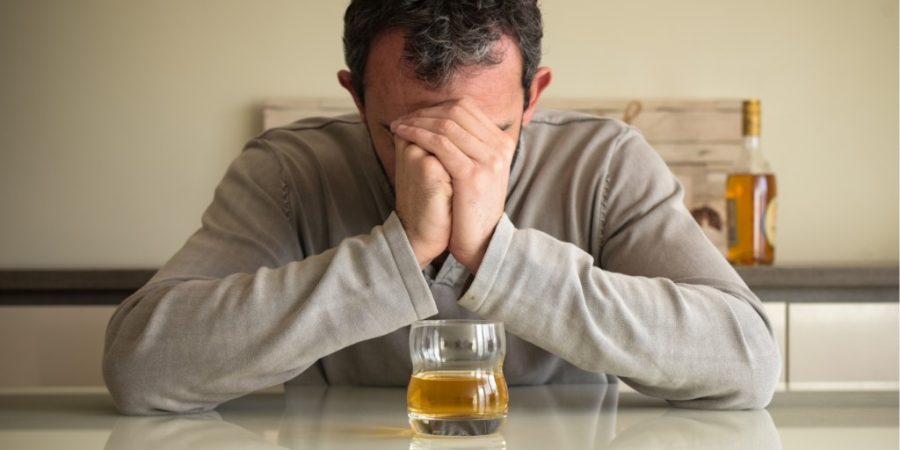
Post-traumatic stress disorder (PTSD) and alcohol use disorder are arguably the two biggest mental health challenges affecting veterans today. Even worse, these two disorders can often feed off each other in a negative downward spiral. Fortunately, treatment at a veteran’s rehab facility can treat both of these disorders simultaneously. Recovery is possible, and the team at Heroes’ Mile can show you how.
Table of Contents
Post-Traumatic Stress Disorder in Veterans

PTSD affects roughly 13% of all veterans in the United States. When experiencing a traumatic event, it is completely normal for people to feel shocked, numb, anxious, and afraid. But when these symptoms last well after the event has passed, it becomes a disorder that can color the rest of your life.
PTSD symptoms fall into four distinct categories:
- Intrusive symptoms
- Avoidance of situations
- Changes in mood
- Increased arousal in several domains
For example, intrusive symptoms may include flashbacks to the traumatic experiences, recurring nightmares, or invasive memories. Avoidant symptoms may mean that people with PTSD avoid situations that remind them of the traumatic event. And the changes in mood and arousal symptoms mean that people experiencing PTSD are often irritable, jumpy, and anxious—even though there is no danger present.
Put simply, people who live with PTSD are often overly vigilant, even when the situation doesn’t warrant such precautions. This is ultimately a defense mechanism, in that the brain tries to prevent itself from being harmed again. Unfortunately, these behaviors often do more harm than good. In fact, they’re a large part of the reason behind the connection between PTSD and alcohol.
Alcohol Use Disorder in Veterans
In terms of substance use, alcohol is by far the most misused substance in veteran populations. A recent study found that 13.8% of veterans had a lifetime diagnosis of alcohol use disorder. For comparison, opioid use disorders were less than 1%.
Like all substance use disorders, alcohol addiction can create devastating consequences for veterans. It impacts veterans’ physical health, mental health, relationships, and family life. It can also lead to extreme financial hardship and the worsening of other mental health conditions.
Crucially, veterans who have developed an alcohol use disorder may not be able to stop on their own. This isn’t a matter of willpower—prolonged alcohol use can result in brain changes that make it harder to stop on your own. It makes other activities and hobbies seem less appealing and creates drastic physical withdrawal symptoms when somebody stops drinking suddenly. And these brain changes are also partially responsible for the destructive relationship between PTSD and alcohol.
How PTSD and Alcohol Influence Each Other

PTSD and alcohol use disorder frequently co-occur. For most veterans, PTSD is the first diagnosis, though this relationship can go either way. But why are PTSD and alcohol so interconnected?
The simple answer is that many veterans with PTSD use alcohol as a tool to treat their symptoms. Veterans who can’t sleep at night or constantly relive traumatic experiences turn to alcohol to diminish these symptoms, and for a time, it may seem beneficial. Yet after using this strategy repeatedly, many veterans find themselves entering into the negative spiral of addiction:
- They drink to cope with their symptoms
- Drinking repeatedly to cope with symptoms causes their tolerance to increase
- More alcohol is consumed to create the desired effect
- Withdrawal symptoms from alcohol begin to worsen PTSD symptoms, leading people to drink even more
- When they try to stop drinking, they find it hard to stop on their own
Unfortunately, this cycle is all too common in the treatment of veterans with co-occurring PTSD and alcohol use disorder. Data suggests that between 55-68% of veterans with PTSD also have an addiction to alcohol. Thankfully, there is a way that veterans can recover: by seeking quality mental health and addiction treatment at a facility that truly understands.
Treating Veterans with PTSD and Alcohol Use Disorder
Heroes’ Mile is Florida’s leading provider of addiction treatment for veterans. Our facility was made by veterans, for veterans, and focuses entirely on helping veterans with substance use disorders find recovery. This means using the best evidence-based treatment methods to stop addiction, as well as treating veterans’ mental health struggles. This includes PTSD treatment, addressing military sexual trauma, and helping veterans to reintegrate into civilian life.
We tackle this problem with targeted evidence-based practices at our facility:
- Group therapy with other veterans, for true peer-to-peer support
- Individual therapy with therapists trained in military issues
- Several PTSD treatment options, including EMDR
- 12-Step treatment for addiction
Our experience has shown that recovery is possible through common ground. This extends beyond accepting only veteran clients: our staff is made up of mostly veterans as well. Too often, veterans entering traditional addiction treatment feel like outsiders. They are surrounded by people who can’t relate to their experiences or empathize with their struggles. Unlike traditional treatment facilities, at Heroes’ Mile you work with peers who have shared military experiences working towards a common goal.
Get Started at Heroes’ Mile Today
When you’re ready to start treating PTSD and alcohol use disorder at a facility that understands the experience of veterans in America, reach out to Heroes’ Mile today. Our program covers the full continuum of addiction care, from medical detox to residential treatment, to outpatient treatment and beyond. From the moment you call our facility, our expert staff will be there to support you in your journey to recovery.
Don’t let PTSD and alcohol problems hold you back anymore. Long-lasting recovery is achievable for any veteran, provided you take the first step to reach out for help. Call our team at 888-838-6692 or fill out our confidential online form to reach one of our team members and start your recovery today.
The post PTSD and Alcohol: How Trauma Can Lead to Alcoholism appeared first on Heroes’ Mile Veterans Recovery Center.
Source
Original Author: Heroes’ Mile

